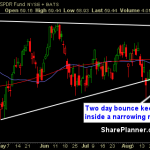
Turn on financial television or pick up a financially related magazine or newspaper and you will hear, or read, about what an analyst from some major Wall Street brokerage has to say about the markets or a particular company. For the average person, and for most financial advisors, this information as taken as “fact” and is used as a basis for portfolio investment decisions.
But why wouldn’t you?
After all, Carl Gugasian of Dewey, Cheatham & Howe just rated Bianchi Corp. a “Strong Buy.” That rating is surely something that you can “take to the bank”, right?
Maybe not.
For many years, I have been counseling individuals to disregard mainstream analysts, Wall Street recommendations, and even MorningStar ratings, due to the inherent conflict of interest between the firms and their particular clientèle. Here is the point:
Major brokerage firms are big business. I mean REALLY big business. As in $1.5 Trillion a year in revenue big. The table below shows the annual revenue of 32 of the largest financial firms in the S&P 500.

(The combined revenue of the 32 largest firms last year was in excess of $1 Trillion with the revenue of the 97 financial firms in the S&P 500 bringing in $1.5 Trillion.)
As such, like all businesses, these companies are driven by the needs of increasing corporate profitability on an annual basis regardless of market conditions.
This is where the conflict of interest arises.
When it comes to Wall Street profitability the most lucrative transactions are not coming from servicing “Mom and Pop” retail clients trying to work their way towards retirement. Wall Street is not “invested” along with you, but rather “use you” to make income.
This is why “buy and hold” investment strategies are so widely promoted. As long as your dollars are invested the mutual funds, stocks, ETF’s, etc, brokerage firms collect fees regardless of what happens in the market. These strategies are certainly in their best interest – they are not necessarily in yours.
But those retail management fees are simply a sideline to the really big money.
Wall Street’s real clients are multi-million, and billion, dollar investment banking transactions, such as public offerings, mergers, acquisitions and bond offerings which generate hundreds of millions to billions of dollars in fees for Wall Street each year.
In order for a firm to “win” that business, Wall Street firms must cater to those prospective clients. In this respect, it is extremely difficult for the firm to gain investment banking business from a company they have a “sell” rating on. This is why “hold” is so widely used rather than “sell” as it does not disparage the end client. To see how prevalent the use of the “hold” rating is I have compiled a chart of 4625 stocks ranked by the number of “Buy”, “Hold” or “Sell.”












Leave A Comment